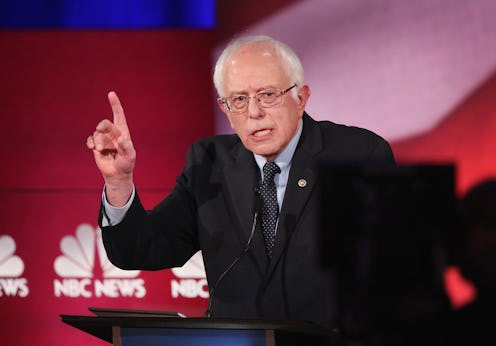News
This One Quote Carried The Dem Debate
On Sunday night, the Democrats held their final presidential debate before the Feb. 1 Iowa caucuses, and it was just as testy and confrontational as everyone predicted. But it was also memorable for some pretty noteworthy, newsworthy, stirring moments. Like Bernie Sanders' calls for economic justice, Hillary Clinton's appeals on behalf of the people of Flint, Michigan, and Martin O'Malley's ... well, there were some good moments from everyone. But for my money, one thing in particular really stood out: The one quote from the Democratic debate that you should really hear.
It came from Sanders, the hard-charging, self-avowed Democratic socialist from Vermont, who's mounted a massively successful challenge against Clinton thus far. The candidates were asked to speak about the high-profile incidents of police violence against black Americans. Specifically, moderator Lester Holt asked about South Carolina man Walter Scott, who was fatally shot in the back while fleeing from Officer Michael Slager on April 4, 2015. In response, Sanders actually got somewhat specific, citing some key proposals he'd push forward as president. It was a strong moment for him, especially considering how badly he lags in the polls with nonwhite Democratic voters. But when he was asked a question (submitted by a young woman via YouTube) about conflicts of interest in the prosecutions of local police officers, he seemed to have an answer ready immediately:
Absolutely, this is a responsibility for the U.S. Justice Department to get involved. Whenever anybody in this country is killed while in police custody, this should automatically trigger a U.S. attorney general’s investigation.
This was just one of the proposals Sanders made. He also suggested demilitarizing local police departments, which countless people have been calling for since the scenes that played out in Ferguson, Missouri in 2014. He also called for police departments to "look like the communities they serve in their diversity." Both of those points are things that Sanders has been saying for a while ― they have been listed in his racial justice platform on his campaign website.
But that first point, about utilizing federal investigations whenever people die by police hands, is new, and it's a pretty concrete proposal that's nice to hear. One of the major frustrations for anti-police-violence activists and advocates in these debates is that, even as the issues championed by Black Lives Matter have gained prominence and relevance within the Democratic primary process, there's been the feeling that such prominence been more about lip service than actual policy.
And while it's far short of a comprehensive plan that fully captures the urgency of the situation ― releasing a Day 1 plan, or some schedule for his first 100 days, would be a nice show of priority ― it's still as vital and meaningful a policy suggestion as was made in the debate, highlighting the considerable bias and perils of conflict of interest in allowing local prosecutors to handle cases against local police. And considering how the debate was never more exciting, alive, or crackling with energy as when the candidates took on racial inequities in the criminal justice system, it might just be the biggest single takeaway.
It's highly appropriate to see Sanders making this case, as well. If it hadn't been for Black Lives Matter protesting a couple of his events in 2015 ― at the Netroots Nation conference and a campaign event in Seattle ― it's doubtful that the issues would've ever seized as much awareness and attention as they have in the Democratic primary so far. That's a lesson to anyone out there who scolded those protesters for being "rude," or worse yet, "ineffective." Thanks to those efforts, Sanders has become a far stronger candidate than he ever could've been before, and that was on display on Sunday.
